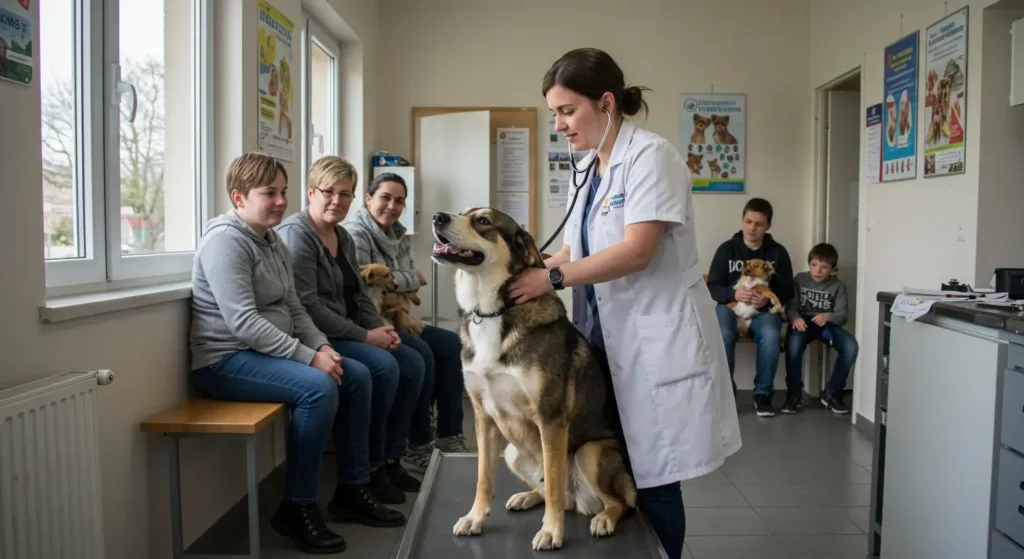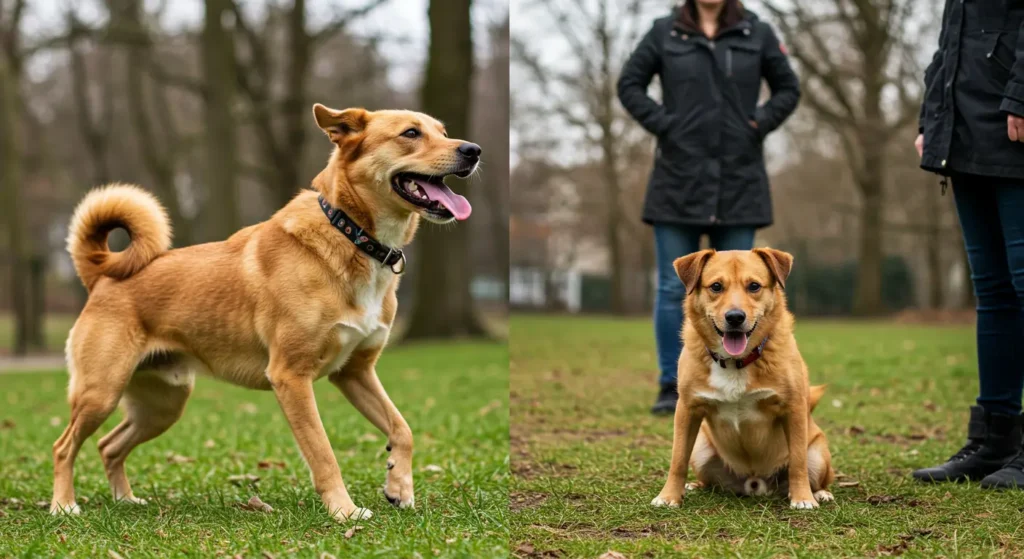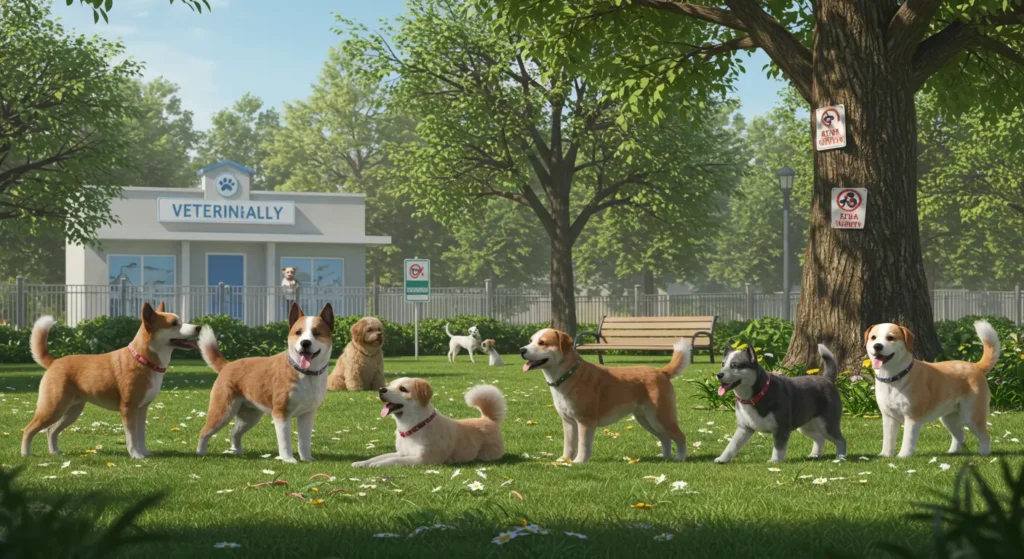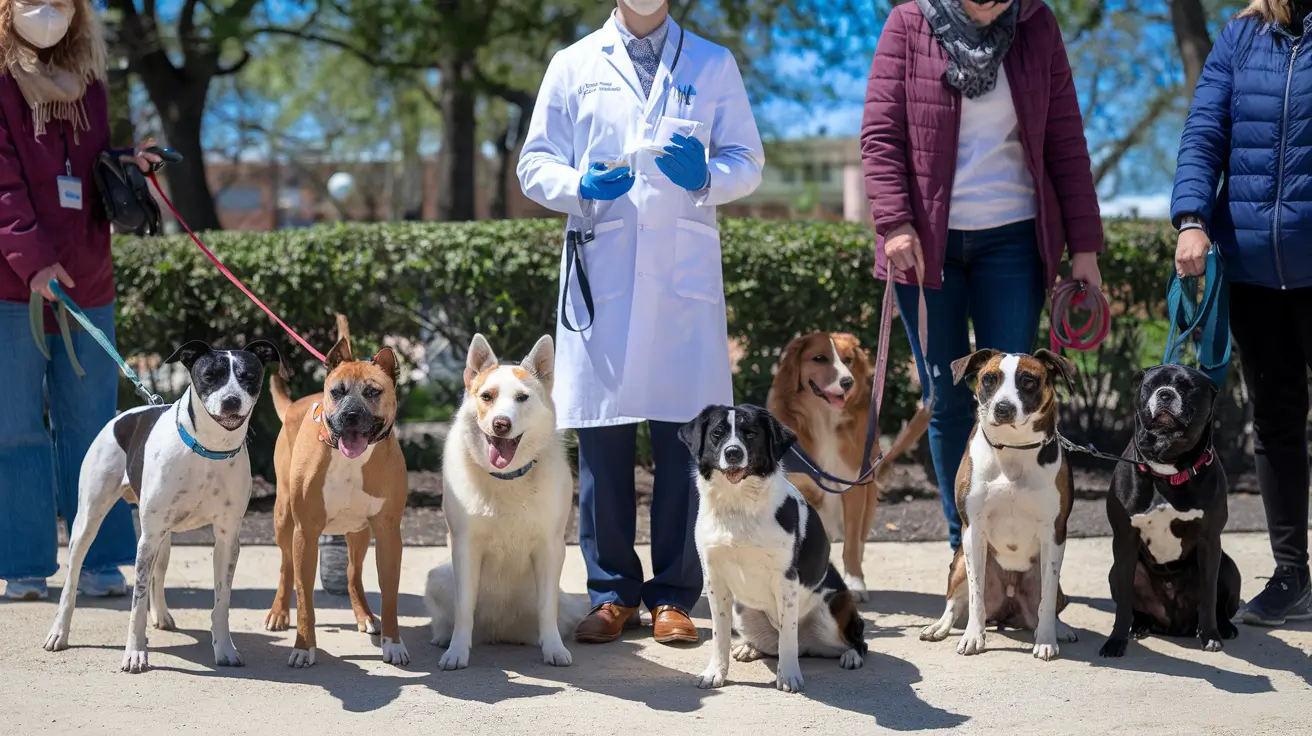As a dog owner, you might wonder if dogs need to be neutered. Neutering offers many benefits for your pet’s health and happiness. It prevents unwanted litters and helps fight pet overpopulation, a big issue in many places.
It’s important to think about the good and bad sides of neutering. Neutering can save you money on vet bills over time. It also helps with aggressive behavior and stops dogs from roaming too far. Knowing the pros and cons helps you choose what’s best for your dog.
Table of Contents
Understanding Dog Neutering: What It Means for Your Pet
As a dog owner, knowing about neutering is key. Neutering means removing a dog’s reproductive parts. This stops them from having puppies. It also changes their behavior and health.
Thinking about spaying and neutering in dogs means looking at the good and bad sides. It can stop testicular cancer and prostate problems. It also cuts down on unwanted behaviors like marking and humping. But, the best time to do it depends on your dog’s breed and size.
Some big pluses of neutering are:
- Less chance of testicular cancer and prostate infections
- Less of those hormone-driven behaviors like marking and humping
- Less likely to wander off or get aggressive
But, there are downsides too. These include bad reactions to anesthesia and infections. Yet, with the right care, these risks can be kept low.
Choosing to neuter your dog should be a well-thought-out decision. Talk to a vet and think about what’s best for your pet. This way, you can decide the right time to neuter your dog.
| Benefits of Neutering | Risks and Complications |
|---|---|
| Reduced risk of testicular cancer | Adverse reactions to anesthesia |
| Decreased hormone-related behaviors | Infection |
| Reduced risk of roaming and aggression | Bleeding and bruising |
The Complete Health Benefits of Neutering Your Dog
Neutering your dog can prevent many health issues and unwanted behaviors. It greatly reduces the risk of testicular cancer in male dogs. It also helps prevent prostate problems and uterine infections. These are key reasons why pet owners choose to neuter their dogs.
Neutering also helps with unwanted behaviors like roaming and urine-marking. Neutered male dogs are 70% less likely to wander off. They also mark less because they don’t have the urge to breed. This makes life better and safer for both the dog and its owner.

The main health benefits of neutering your dog are:
* It prevents testicular cancer
* It reduces prostate issues
* It stops uterine infections
* It cuts down on roaming and urine-marking
Thinking about these benefits can help you decide what’s best for your dog.
Behavioral Changes After Neutering
When thinking about neutering dogs pros and cons, it’s key to look at how it might change your dog’s behavior. Neutering can make your dog less aggressive and stop them from marking their territory. Knowing these changes can help you decide if neutering is good for your dog.
Here are some key changes you might see after neutering:
- Less aggressive behavior: Neutering can cut aggression in male dogs by more than half.
- Less marking territory: Neutering can stop male dogs from marking almost completely if done early.
- Less roaming: Neutering can make both male and female dogs roam less, which means fewer accidents.
It’s also important to think about the risks of not neutering your dog. These include more aggression, roaming, and unwanted pregnancies. By understanding the neutering dogs pros and cons and the possible changes, you can choose what’s best for your dog’s health and happiness.

Neutering also affects your dog’s health in big ways. It can lower the risk of testicular cancer and prostate disease. Plus, it stops unwanted pregnancies.
| Behavior | Pre-Neutering | Post-Neutering |
|---|---|---|
| Aggression | High | Decreased by over 50% |
| Marking Territory | Common | Eliminated to almost 2% |
| Roaming | High | Significantly reduced |
Do Dogs Need to Be Neutered? Making an Informed Decision
As a responsible dog owner, it’s key to think about the importance of spaying and neutering pets. This affects your dog’s health and happiness. The choice to neuter depends on your dog’s breed, age, and health. Early neutering might raise the risk of joint problems and some cancers in certain breeds.
When deciding on neutering, balance the benefits of neutering dogs with possible downsides. Important factors include:
- Reduced risk of testicular and prostate cancer
- Less aggression and wandering off
- Stopping unwanted breeding and overpopulation
- Potential effects on joints and some cancers
Remember, many states require dogs in shelters to be spayed or neutered before adoption. Sadly, millions of dogs and cats are put down each year in the U.S. due to too many pets. By choosing to neuter wisely, you can help avoid these problems and keep your dog healthy and happy.

In the end, the decision to neuter should fit your dog’s unique situation and talk with a vet. By understanding the importance of spaying and neutering pets and considering the pros and cons, you can make a choice that’s best for your dog’s health and happiness.
The Best Age to Neuter Your Dog
Deciding when to neuter your dog depends on several things like breed, size, and how fast they grow. It’s a big decision, and knowing the reasons for neutering your pet helps. Veterinarians now suggest neutering at different ages, focusing on both early and later options.
Male dogs should wait until they are 9-18 months old to be neutered, especially big breeds. This helps avoid certain cancers and injuries later. Small dogs can usually be neutered at 6-12 months without worrying about bone problems.
- Small breeds: 6-12 months
- Medium breeds: 9-12 months
- Large breeds: 9-18 months
Always talk to your vet to find the right time to neuter your dog. They’ll consider your dog’s specific needs and health.
The American Veterinary Medical Association suggests a personalized plan. They look at each dog’s breed, age, and health risks. By thinking about these and talking to your vet, you can choose the best time to neuter your dog. This ensures your pet’s health and happiness.
| Breed Size | Recommended Neutering Age |
|---|---|
| Small | 6-12 months |
| Medium | 9-12 months |
| Large | 9-18 months |
Potential Risks and Complications
Thinking about the risks of not neutering your dog is important. It’s key to know the possible problems with the surgery too. About 2.1% of dogs under anesthesia face complications, with a death rate of 0.11%.
Neutering can lead to complications in 0% to 32% of dogs. Younger dogs are more likely to have problems. Also, spay and neuter surgeries can lead to infections in 2.2% to 5.7% of cases. Early neutering might also raise the risk of bone cancer and cruciate rupture.
Some important points to remember are:
- Increased risk of anesthetic complications and mortality
- Higher complication rates in younger patients
- Potential increased risk of certain health issues, such as bone cancer and cruciate rupture
- Infection rates associated with spay and neuter surgeries
Talking to a vet is crucial. They can help you understand the risks of not neutering your dog and the surgery’s benefits. This way, you can choose what’s best for your pet’s health.
Recovery and Post-Operative Care
After neutering, it’s key to give your dog the right care. This ensures they stay healthy and happy. Neutering helps prevent health problems and stops unwanted litters.
In the first week, keep your dog calm and still. This means less play and no jumping. Watch the incision for any signs of trouble like swelling or discharge. If you see anything odd, call your vet right away.
Here are some important tips for recovery:
- Feed your dog less for the first day
- Keep an eye on the incision for infection signs
- Don’t let your dog run around for two weeks
- Use a collar to protect the surgery area
By following these steps, you help your dog recover well. This way, they can enjoy the health benefits of neutering.
| Day | Activity Level | Food Intake |
|---|---|---|
| 1 | Minimal | Quarter to half of normal amount |
| 2-7 | Restricted | Gradually increase to normal amount |
| 8-14 | Normal | Normal amount |
Cost Considerations and Insurance Coverage
Thinking about neutering your dog? It’s key to weigh the importance of spaying and neutering pets and the costs. The price to neuter a dog varies from $35 to $350. This depends on the dog’s age, breed, where you live, and any health issues it might have.
The benefits of neutering dogs are many. They include less chance of health problems and bad behavior. But, the cost can be a big worry for many. Here are some costs to think about:
- Neutering: $35-$350
- Spaying: $50-$500
- Pre-surgical procedures: $50-$200
- Post-operative care: $25-$100
Some places offer low-cost or free neutering. You might also find pet insurance that covers these costs. It’s smart to look around and compare to find the best deal for your pet.
By looking at the costs and benefits, you can choose what’s best for your dog. Don’t forget the ongoing costs of owning a pet. These can add up to about $2,500 a year in the U.S.
| Procedure | Cost Range |
|---|---|
| Neutering | $35-$350 |
| Spaying | $50-$500 |
| Pre-surgical procedures | $50-$200 |
| Post-operative care | $25-$100 |
Conclusion: Making the Right Choice for Your Dog’s Future
Thinking about neutering your dog? It’s key to look at both sides of the coin. Neutering can help prevent some cancers and behavior problems. But, always talk to your vet and keep up with new research on timing and long-term effects.
Choosing to neuter your dog is a big decision. It should be made with your pet’s health and happiness in mind. Knowing the benefits of neutering dogs helps you make a choice that’s best for them. Remember, every dog is different. The right choice depends on their breed, size, and health.
To understand why some dog owners choose not to neuter their pets, read our article on Why Not Neuter Your Dog? Exploring the Reasons and Risks
FAQ
What is the definition of neutering and how does it differ from spaying?
Neutering is a surgery that stops a dog from reproducing by removing their reproductive organs. Spaying is when a female dog’s ovaries and uterus are removed. Neutering is for both males and females.
What are the health benefits of neutering a dog?
Neutering can prevent diseases like testicular cancer and prostate issues. It also lowers the risk of uterine infections. It can also reduce aggression and roaming.
How do behavioral changes occur after neutering a dog?
Neutering can make dogs less aggressive and less likely to mark territory. It also stops them from wandering off as much.
When is the best age to neuter a dog?
The best age to neuter a dog depends on their breed, size, and health. Consider their growth and health when deciding.
What are the potential risks and complications associated with neutering?
Neutering is usually safe, but there are risks. Talk to your vet about these to make a good choice.
What should I expect during the recovery and post-operative care process?
After neutering, your dog needs rest and less activity. Follow your vet’s care instructions closely.
How much does neutering a dog cost, and what insurance coverage options are available?
Neutering costs vary by location and vet. Look into insurance options to help with the cost.

